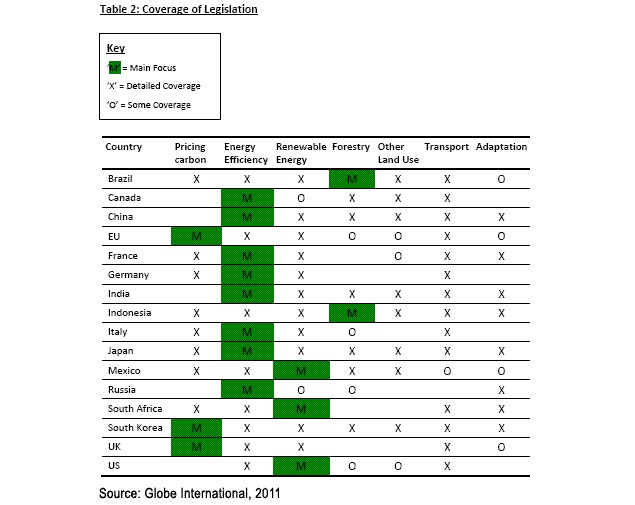A new study [PDF] released by GLOBE international — a coalition of legislators from around the world — found that “climate change is featuring prominently on the legislative agenda across the 16 major economies.” The study, conducted by the Grantham Institute for Climate Change at the London School of Economics, documents the kinds of actions that countries are taking at home to reduce their emissions. While it doesn’t tell us the impact of those measures, it does show a growing commitment of countries to change their laws, policies, and regulations to address their carbon pollution. This is a focus that recently emerged at the global warming negotiations when developed and developing countries presented details on the actions they are taking to meet their commitments to reduce emissions. These are the kinds of actions that are essential to addressing global warming as we ultimately need countries acting, not just saying they’ll act.
While not intended to be a full list of all the measures that a country is taking — they don’t include state/provincial measures — the report does provide a good glimpse into the actions in these 16 countries (the report provides good details for each country). The countries documented are the biggest emitting countries and collectively account for over 70 percent of the world’s emissions, so the actions that they take at home are crucial to solving this challenge. Here is a quick summary of the types of actions that these countries are taking and the coverage of those actions:

As the report [PDF] notes:
This activity suggests that the difficult talks in Copenhagen, and the subsequent slow progress in the formal negotiations, has not diminished countries’ appetite for developing climate change legislation, perhaps recognizing that many of the actions required to reduce emissions and to adapt to a changing climate, are directly in the national interest.
This is a very positive development, as countries are now motivated by self-interest to act. The global negotiations put a spotlight on this action and reinforce the need for countries to come prepared with commitments and actions. In the lead-in to Copenhagen, countries knew that the spotlight would be on them, so they needed to come prepared with real commitments to address their carbon pollution.
In the lead-in to the next annual high-level global warming negotiations in Durban, South Africa, let’s hope that countries don’t lose sight of what ultimately matters: what actions countries are taking at home and what kind of impacts are those actions having in reducing carbon pollution.
They’ll have another chance in Durban this December, and then in June 2012 when world leaders meet at the Rio+20 Earth Summit to take further steps to deploy clean energy, improve their energy efficiency, and reduce deforestation emissions. I hope they take advantage of these opportunities. The spotlight will be on them.



